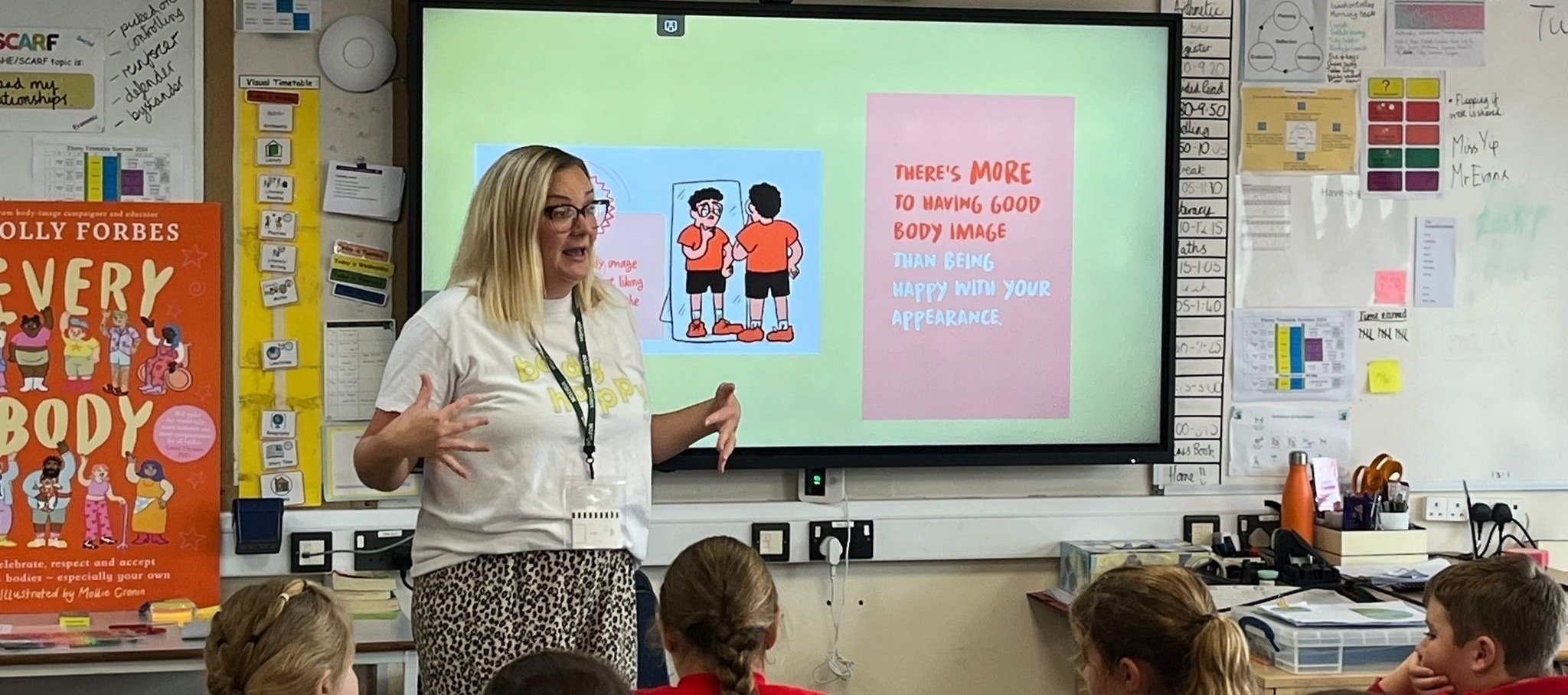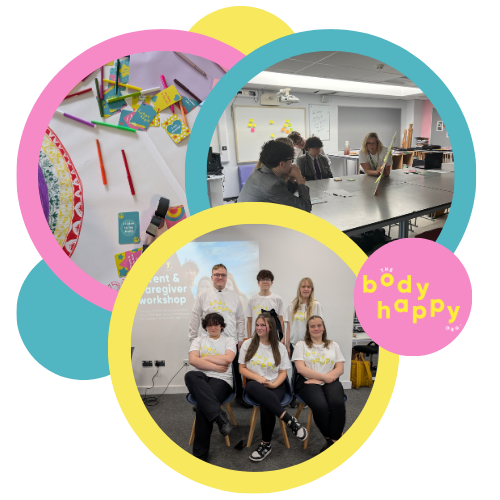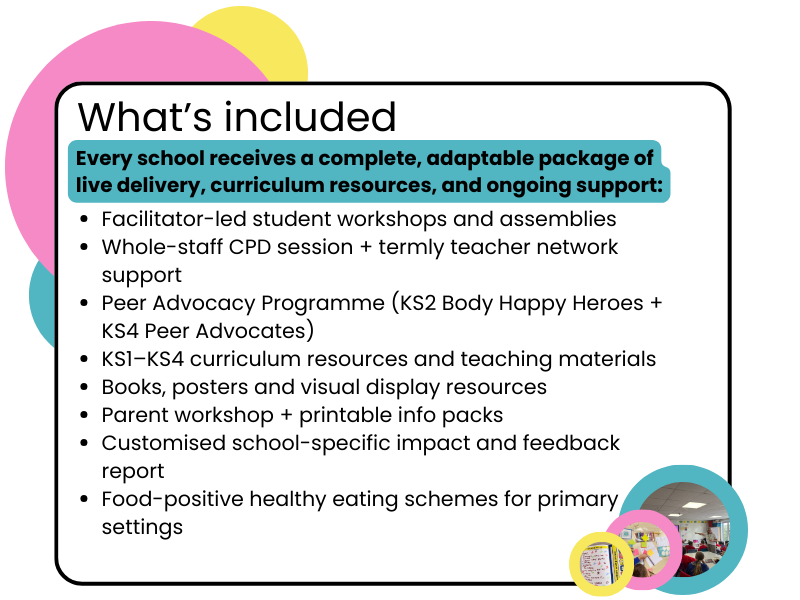
Schools
Programme
Helping children and young people celebrate, respect and accept ALL bodies — especially their own.
Body Happy Schools Programme
The Body Happy Schools Programme is the UK’s first whole-school body respect education programme. It goes beyond PSHE — embedding inclusion, safeguarding, wellbeing and educational equity across your setting.
Through CPD, peer advocacy, student workshops, curriculum resources, and engagement and support for parents and carers, we help schools embed a whole-school approach — creating lasting cultures of inclusion, wellbeing and body respect.
We are proud winners of the Fair Education Alliance Innovation Award, recognising our fresh approach: treating body image as a body respect and inclusion issue — not just a PSHE topic.
This award supported the pilot phase, enabling the development of an evidence-informed, school-tested programme designed for sustainable, school-wide change.
Theory of Change
Body shame starts young — but so can body respect.
We’ve created a clear, evidence-informed Theory of Change to guide our work. It’s a practical roadmap that shows how schools can move from piecemeal PSHE to lasting, whole-school culture change.
At its heart is a simple belief: when students feel accepted and respected in their bodies, they thrive - in friendships, in learning, and in life. Every strand of our programme is designed to build that foundation, from teacher training to peer advocacy, curriculum to community.
The Four Body Happy Skills
Each programme strand is built around the Four Body Happy Skills — evidence-informed learning goals aligned with the curriculum, Ofsted standards, and wider school priorities:
1. Body Happy Literacy
Developing body image literacy — understanding how we think and feel about our bodies — alongside learning about physical development and body diversity.
2. Body Happy Resilience
Building emotional tools to navigate appearance pressures, appearance-related distress, bullying, social media, and supporting positive mental health.
3. Body Happy Kindness
Developing empathy, self-compassion, and respectful peer relationships to strengthen inclusive classroom cultures.
4. Body Happy Advocacy
Understanding and challenging inequalities related to body image, bias, and representation — empowering pupils to champion inclusion.
All four Body Happy Skills align with statutory PSHE and RSHE guidance, Ofsted inspection priorities, safeguarding expectations, and curriculum outcomes — while also supporting a whole-school approach to wellbeing and inclusion.
“This programme is really important to us because it directly supports emotional well-being, self-esteem, and development of young people during one of the most vulnerable and influential stages of their lives. It’s so important for us because when students feel good about themselves they’re more likely to engage positively in school – both academically and socially.”
1. Body Happy Literacy
Developing knowledge and understanding of body image — how we think and feel about our bodies — alongside learning about physical development and body diversity.
Students explore how bodies change, differ and are represented, and learn to challenge harmful myths and misinformation about bodies.
-
PSHE statutory requirements (Relationships, Health Education and Body Image)
Science curriculum (puberty, development, reproduction)
RSHE guidance on physical health, mental wellbeing and body image
Safeguarding duties (preventing disordered eating and appearance-related distress)
-
Builds student confidence around body changes and diversity
Strengthens resilience against appearance pressures
Encourages critical thinking about media and social influences
94.2% of Year 5–6 pupils said they learned new ways to think and feel about their bodies after the workshop.
Staff confidence in identifying body image risk factors, recognising weight stigma, adapting the curriculum, and embedding prevention strategies increased by 33.4 percentage — from 57.1% to 90.5% after CPD.
Students reported "learning all different body facts, how to take care of our bodies and how to respect our own bodies and others.” – Belle, Year 5.
86.1% of students reported learning about body image post-programme (up from 48.9%). Pilot schools embedded key ideas into safeguarding and behaviour policy updates.
2. Body Happy Resilience
Developing emotional awareness and strategies to cope with appearance pressures, bullying, social media, and body image-related distress.
-
Ofsted personal development judgement (resilience, self-regulation, positive mental health)
Anti-bullying policy implementation
Online safety guidance
Behaviour and relationships frameworks (DfE 2022)
-
Reduces appearance-based bullying and social comparison
Strengthens classroom culture and peer relationships
Equips pupils with tools to navigate pressures and digital environments
+21.7% increase in students feeling confident that bullying would be addressed in school (All Saints culture survey: 53.3% → 75%)
Teachers observed "more confident students, less bullying, less harmful words being used,” and stronger inter-year relationships
Pupils shared how the workshop helped them pause before judging themselves or others:
Peer advocates in KS4 helped younger students explored the role of media and stereotypes in shaping self-worth: “A lot of people won’t feel comfortable in their bodies because of the standards that are put out there… which leads to bullying.” – Sam, Year 10
3. Body Happy Kindness
Developing empathy, acceptance, and positive peer culture — including kindness towards self and others.
-
Ofsted personal development and behaviour expectations
PSHE focus on respectful relationships and inclusion
Whole-school anti-bullying and wellbeing policies
Mental health promotion and early intervention strategies
-
Encourages peer support and inclusive behaviours
Promotes positive language and respectful attitudes
Builds safer, more welcoming school environments
Teachers reported increased peer support and inclusive behaviour across year groups: “Students who we wouldn’t normally associate with younger years now approach them and check in.” – Kirsty Bird, Head of Year 10 All Saints Academy Plymouth
+20% increase in students who felt appearance-based bullying was taken seriously in school (PRE 53.3% → POST 75%)
“I’ve learned that I shouldn’t be mean to my body and that if you be mean to other people it will make them feel bad.” – Summer, Year 6
4. Body Happy Advocacy
Understanding and challenging inequalities related to body image, appearance-based bias, and representation.
-
Equality Act 2010 (Public Sector Equality Duty)
Ofsted inspection framework (diversity, inclusion, pupil voice)
Citizenship and SMSC development
Whole-school culture and strategic planning
-
Raises awareness of issues such as weight stigma, hair discrimination, and ableism
Empowers pupils to lead positive change through peer advocacy
Embeds a culture of respect and social responsibility across the school
“Everyone’s included in a Body Happy School – there’s no disclusion.” – Elodie, Year 6
+21.7% increase in student respect for body diversity (PRE 53.3% → POST 75%)
Peer-led changes included anti-bullying interventions, uniform policy reviews, and new displays — reported across all three pilot schools
Pupil Voice: “We’ve actually had many problems sorted because of the bullying box project we did as part of the peer programme. It makes me feel happy seeing people trust it and know it’s helping people.” – Paige, Year 10 Peer Advocate
Pricing & Funding
We offer subsidised pricing for schools, with further discounts available for settings with higher levels of need.
Primary schools can use PE and Sport Premium to contribute to costs.
Contact us for a bespoke quote if your school falls outside these categories. We can also help you explore relevant funding options.
Schools with >50% pupil premium may qualify for up to 50% further discount.
Backed by Research
The Body Happy Schools Programme is supported by a research partnership with the University of Lincoln, including a fully funded PhD (starting September 2025) through the South East Network for Social Sciences.
Ready to build a culture of body respect in your school?
Let’s talk about how we can support your students, staff and wider community.






